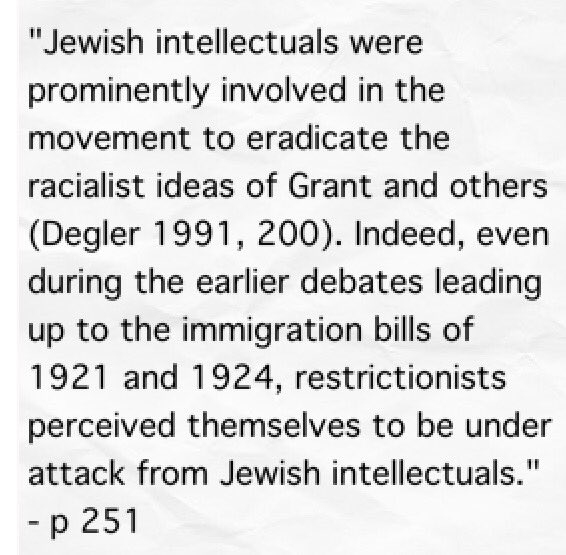
1/ “Finally, Jews have also been instrumental in organizing African Americans as a political force that served Jewish interests in diluting the political and cultural hegemony of non-Jewish European Americans.” - p 254
2/ “Jews played a very prominent role in organizing blacks beginning with the founding of the National Association for the Advancement of Colored People (NAACP) in 1909 and, despite increasing black anti-Semitism continuing into the present.” - p 254
3/ “‘By mid-decade [c. 1915], the NAACP had something of the aspect of an adjunct of B’nai B’rith and the American Jewish Committee...
4/ ... with the brothers Joel and Arthur Spingarn serving as board chairman and chief legal counsel...Herbert Lehman on the executive committee; Lillian Wald and Walter Sachs on the board (though not simultaneously); and Jacob Schiff and Paul Warburg as financial angels...
5/ ...Small wonder that a bewildered Marcus Garvey stormed out of NAACP headquarters in 1917, muttering that it was a white organization (Levering-Lewis 1984, 85)’” - p 254
6/ “Wealthy Jews were important contributors to the National Urban League as well, ‘Edwin Seligman’s chairmanship, and the presence on the board of Felix Alder, Lillian Wald, Abraham Lefkowitz, and, shortly thereafter...
7/ ...Julius Rosenwald, principal Sears, Roebuck Company stockholder, forecast significant Jewish contributions to the League’ (Levering-Lewis 1984, p. 85).” - p 255
8/ “In addition to providing funding and organizational talent (the presidents of the NAACP were Jews until 1975), Jewish legal talent was harnessed on behalf of African American causes.” - p 255
9/ “Louis Marshall, a prominent player in the Jewish efforts on immigration (see below), was a principal NAACP attorney during the 1920s.” - p 255
10/ “African Americans played little role in these efforts: For example, until 1933 there were no African American lawyers Jen the NAACP legal department (Friedman 1995, 106).” - p 255
11/ “Indeed, a theme of revisionist historians reviewed by Friedman is that Jews organized African Americans for their own interests rather than in the best interests of African Americans.” - p 255
12/ “In the post-WWII period the entire gamut of Jewish civil service organizations were involved in black issues, including the AJCommittee, the AJCongress, and the ADL: ‘With professionally trained personnel, fully equipped offices, and public relations know-how...’” p 255
13/ “Jews contributed from two-thirds to three-quarters of the money for civil rights groups during the 1960s (Kaufman 1997, 110). Jewish groups, particularly the AJCongress, played a leading role in drafting civil rights issues mainly benefitting blacks (Svonkin 1997, 79-112).”
14/ “‘Jewish support, legal and monetary, afforded the civil rights movement a string of legal victories...
15/ ...There is little exaggeration in an American Jewish Congress lawyer’s claim that ‘many of these laws were actually written in the offices of Jewish agencies by Jewish staff people, introduced by Jewish legislators and pressured into being by Jewish voters.’...” - p 255
16/ “Harold Cruse (1967, 1992) presents a particularly trenchant analysis of the Jewish-black coalition that reflects several themes of this volume. First, he notes, ‘Jews know exactly what they want in America.’” - p 255
17/ “Jews want cultural pluralism because of their long-term policy of non-assimilation and group solidarity. Cruse notes, however, that the Jewish experience in Europe has show them that ‘two can play at this game’ (i.e. develop highly nationalistic solidarity groups)...
...and ‘when that happens, woe be to the side that is short on numbers’...Cruse observes that Jewish organizations view Anglo-Saxon (read Caucasian) nationalism as their greatest potential threat...
19/ ...and they have tended to support pro-black integration (i.e. assimilationist, individualist) policies for blacks in America, presumably because such policies dilute Christian power and lessen the possibility of a cohesive, nationalist anti-Semitic Caucasian majority.”
20/ “At the same time, Jewish organizations have opposed a black nationalist position while pursuing an anti-assimilationist, nationalist group strategy for their own group.” - p 256
21/ “Cruse also points out the asymmetry in black-Jewish relations: While Jews have held prominent roles in black civil rights organizations...blacks have been completely excluded from the inner-workings and policy-making bodies in Jewish organizations.” - p 256
22/ “To a considerable extent, at least until quite recently, the form and goals of the black movement in the United States should be seen as an instrument of Jewish strategy with goals very similar to those pursued in the arena of immigration legislation.” - p 256
23/ “The Jewish role in African American affairs must, however, be seen as part of the broader role of what participants termed the ‘intergroup relations movement’ that worked to ‘eliminate prejudice and discrimination against racial, ethnic, and religious minorities’ post-WWII.”
24/ “As with the other movements with strong Jewish involvement, Jewish organizations, particularly the AJCommittee, the AJCongress, and the ADL, were the leaders, and these organizations provided the major sources of funding, devised the tactics, and defined the objectives...”
25/ “As was also the case with the movement to shape immigration policy, its aim was the very self-interested aim of preventing the development of a mass anti-Semitic movement in the United States.” - p 256
26/ “Jewish activists ‘saw their commitment to the intergroup relations movement as a preventative measure designed to make sure “it” - the Nazi’s war of extermination against European Jewry - never happened in America’ (Svonkin 1997, 10).” - p 256
• • •
Missing some Tweet in this thread? You can try to
force a refresh









